|
|
|
Sort Order |
|
|
|
Items / Page
|
|
|
|
|
|
|
| Srl | Item |
| 1 |
ID:
096733
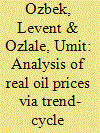

|
|
|
|
|
| Publication |
2010.
|
| Summary/Abstract |
The recent fluctuations in the oil prices have intensified the discussion on the dynamics and causes of real oil price changes. While the long-run component of real oil prices seems to have a stochastic trend, global real economic activity has been thought to generate important changes in real oil prices. Based on this argument, in this paper, we analyze the real oil prices within a trend-cycle decomposition framework, where we impose a stochastic trend and assume the cyclical term to be affected by global economic conditions. We also let the parameters vary over time to see whether shocks to trend and the cycle have changing effects on the real oil prices. As a result, we find that shocks to trend are more persistent recently. In that sense, this paper contributes to the literature by offering an explanation for the increased volatility in oil prices. In addition, we show that global economic activity contributed also to the previous oil price shocks, which were regarded mainly as supply-side driven.
|
|
|
|
|
|
|
|
|
|
|
|
|
|
|
|
| 2 |
ID:
097533
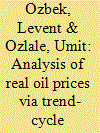

|
|
|
|
|
| Publication |
2010.
|
| Summary/Abstract |
The recent fluctuations in the oil prices have intensified the discussion on the dynamics and causes of real oil price changes. While the long-run component of real oil prices seems to have a stochastic trend, global real economic activity has been thought to generate important changes in real oil prices. Based on this argument, in this paper, we analyze the real oil prices within a trend-cycle decomposition framework, where we impose a stochastic trend and assume the cyclical term to be affected by global economic conditions. We also let the parameters vary over time to see whether shocks to trend and the cycle have changing effects on the real oil prices. As a result, we find that shocks to trend are more persistent recently. In that sense, this paper contributes to the literature by offering an explanation for the increased volatility in oil prices. In addition, we show that global economic activity contributed also to the previous oil price shocks, which were regarded mainly as supply-side driven.
|
|
|
|
|
|
|
|
|
|
|
|
|
|
|
|
| 3 |
ID:
176111
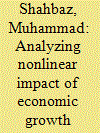

|
|
|
|
|
| Summary/Abstract |
Several Asian countries are facing challenges regarding the accomplishment of the objectives of Sustainable Development Goals (SDGs), and India is facing a similar situation. Following this, this study talks about designing an SDG framework for India, which can be used as a benchmark for other Asian countries. In this pursuit, this study looks into whether per capita income, energy use, trade openness, and oil price have any impact on CO2 emissions between 1980 and 2019. The nonlinear autoregressive distributed lag approach proves that the fluctuations in independent variables have an asymmetric long-term impact on CO2 emissions. The results reveal that the prevailing economic growth pattern in India is environmentally unsustainable, because of its dependence on fossil fuel-based energy consumption and imported crude oil. Import substitution has been identified as one of the first stepping stones to address this issue, and accordingly, a multipronged SDG framework has been designed based on the direct and extended version of the study outcomes. While the Central policy framework shows a way to address SDG 7, SDG 8, SDG 12, and SDG 13, the Tangential policy framework shows the way to sustain the Central policy framework by addressing SDG 4.
|
|
|
|
|
|
|
|
|
|
|
|
|
|
|
|
| 4 |
ID:
171441


|
|
|
|
|
| Summary/Abstract |
We examine the asymmetric effects of oil supply shocks, shocks to global real economic activity, and oil-specific demand shocks on the oil, non-oil and overall trade balances of a large sample of oil exporters and oil importers. Our empirical strategy accounts for endogenous oil prices, heterogeneous parameters, and error cross section dependence within a panel framework. We find that the pattern of asymmetries in the oil price-trade balance relationship depends on the source of the shock. For both oil exporters and oil importers, oil supply expansions are more important than oil supply disruptions; we discuss the role that Saudi Arabia plays in limiting the global effects of oil supply disruptions. Although increases in global demand deteriorate trade balances for oil importers and improve them for oil exporters, decreases in global demand have a similar, rather than an opposite effect. Our results corroborate the existing evidence that oil price increases only generate large global imbalances if they result from demand-side shocks; and we present new evidence that oil price decreases only benefit oil importers if they result from supply-side shocks.
|
|
|
|
|
|
|
|
|
|
|
|
|
|
|
|
| 5 |
ID:
128045


|
|
|
|
|
| Publication |
2014.
|
| Summary/Abstract |
The 2009 Renewable Energies Directive (RED) has set up ambitious targets concerning biofuel consumption in the European Union by 2020. Nevertheless, budgetary constraints and growing concerns about the environmental integrity of first-generation biofuels have imposed a phasing out of the fiscal instruments to promote them. Focusing on France, this paper combines an exogenous increase in oil prices and tax policies on fossil fuels. The objective is to determine the efficiency of an alternative incentive scheme for biodiesel consumption based on a higher price of the fossil fuel substitute. Policy simulations are implemented through a dynamic computable general equilibrium (CGE) model calibrated on 2009 French data. The results show that the 10% biodiesel mandate set by the RED would not be achieved even if the fixed taxes on diesel reach the same level as those on gasoline. Although integrating the rise in oil prices into the fiscal framework improves the biodiesel penetration rate, it remains below the target. Moreover, we find that the effects of biofuel consumption are limited to the biofuel chain sectors. In other agricultural sectors, the substitution effect of biodiesel with diesel is partially offset by the pricing effect induced by higher energy production costs.
|
|
|
|
|
|
|
|
|
|
|
|
|
|
|
|
| 6 |
ID:
110362
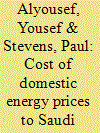

|
|
|
|
|
| Publication |
2011.
|
| Summary/Abstract |
The issue of subsidies on domestic energy prices has moved up the policy agenda, most recently as a result of the G20 commitment in September 2009 to phase out such subsidies. However, what constitutes a "subsidy" is complex and controversial. The IEA in its last World Energy Outlook claimed that Saudi Arabia was second in the world in terms of its levels of subsidy on domestic energy prices. However, because Saudi Arabia is a price maker in the international oil market, the methodology used by the IEA is seriously flawed. This paper explains the problems with the methodology for computing subsidies and explains the correct method in the case of Saudi Arabia. It then attempts to measure the levels of subsidy in Saudi Arabia using this methodology. However, while it converts the IEA's "subsidy" of $23 billion into a net "profit" of $5.7 billion, it goes on to point out that the current low price regime is causing problems for Saudi Arabia.
|
|
|
|
|
|
|
|
|
|
|
|
|
|
|
|
| 7 |
ID:
104868


|
|
|
| 8 |
ID:
115671
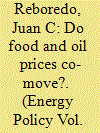

|
|
|
|
|
| Publication |
2012.
|
| Summary/Abstract |
This paper studies co-movements between world oil prices and global prices for corn, soybean and wheat using copulas. Several copula models with different conditional dependence structures and time-varying dependence parameters were considered. Empirical results for weekly data from January 1998 to April 2011 showed weak oil-food dependence and no extreme market dependence between oil and food prices. These results support the neutrality of agricultural commodity markets to the effects of changes in oil prices and non-contagion between the crude oil and agricultural markets. However, dependence increased significantly in the last three years of the sampling period, even though upper tail dependence remained insignificant, indicating that food price spikes are not caused by positive extreme oil price changes. These results have implications for policy design, risk management and hedging strategies.
|
|
|
|
|
|
|
|
|
|
|
|
|
|
|
|
| 9 |
ID:
114301


|
|
|
|
|
| Publication |
2012.
|
| Summary/Abstract |
The European Union has committed itself to reduce greenhouse gas (GHG) emissions by 20% in 2020 compared with 1990 levels. This paper investigates whether this policy has an additional benefit in terms of economic resilience by protecting the EU from the macroeconomic consequences due to an oil price rise.
We use the GEM-E3 computable general equilibrium model to analyse the results of three scenarios. The first one refers to the impact of an increase in the oil price. The second scenario analyses the European climate policy and the third scenario analyses the oil price rise when the European climate policy is implemented.
Unilateral EU climate policy implies a cost on the EU of around 1.0% of GDP. An oil price rise in the presence of EU climate policy does imply an additional cost on the EU of 1.5% of GDP (making a total loss of 2.5% of GDP), but this is less than the 2.2% of GDP that the EU would lose from the oil price rise in the absence of climate policy. This is evidence that even unilateral climate policy does offer some economic protection for the EU.
|
|
|
|
|
|
|
|
|
|
|
|
|
|
|
|
| 10 |
ID:
178020
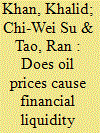

|
|
|
|
|
| Summary/Abstract |
This study measures whether oil prices affect financial liquidity (FL) in the Kingdom of Saudi Arabi (KSA). The results indicate a positive association between oil prices (OP) and FL in the medium run. FL led OP in the short run during the global financial recession, when the KSA used foreign reserves to stabilize the impact of low OP. Similarly, geopolitical risk (GR) led OP in the medium term and had a positive influence on FL in the short term, especially during periods of higher uncertainty. The correlation between OP and FL becomes more noticeable in the medium term in the presence of GR. Short-run volatility can exert pressure on foreign reserves, which can be effectively managed by keeping reserves in the national currency. Similarly, economic growth sources other than oil income and a peaceful solution to regional differences can reduce defense spending.
|
|
|
|
|
|
|
|
|
|
|
|
|
|
|
|
| 11 |
ID:
092549


|
|
|
|
|
| Publication |
2009.
|
| Summary/Abstract |
The increase in oil prices in recent years has occurred concurrently with a rapid expansion of Chinese exports in the world markets, despite China being an oil importing country. In this paper we develop a theoretical model that explains the positive correlation between Chinese exports and the oil price. The model shows that Chinese growth can lead to an increase in oil prices that has a stronger impact on its export competitors. This is due to the large labor force surplus of China. We then examine this hypothesis by estimating a reduced form equation for Chinese exports using Rodrik [Rodrik, Dani, 2006. What's so special about China's exports? China and World Economy 14, 1-19.]'s measure of export competitiveness, together with the oil price, productivity, real exchange rate, and foreign industrial production over the monthly 1992-2005 period. The results suggest a stable relationship and yields slightly positive values for the price of oil and elastic coefficients for export competitiveness, along with the expected negative elasticity for the real exchange rate.
|
|
|
|
|
|
|
|
|
|
|
|
|
|
|
|
| 12 |
ID:
111069
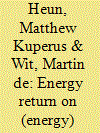

|
|
|
|
|
| Publication |
2012.
|
| Summary/Abstract |
Very little work has been done so far to model, test, and understand the relationship between oil prices and EROI over time. This paper investigates whether a declining EROI is associated with an increasing oil price and speculates on the implications of these results on oil policy. A model of the relationship between EROI and oil market prices was developed using basic economic and physical assumptions and non-linear least-squares regression models to correlate oil production price with EROI using available data from 1954-1996. The model accurately reflects historical oil prices (1954-1996), and it correlates well with historical oil prices (1997-2010) if a linear extrapolation of EROI decline is assumed. As EROI declines below 10, highly non-linear oil price movements are observed. Increasing physical oil scarcity is already providing market signals that would stimulate a transition away from oil toward alternative energy sources. But, price signals of physical oil scarcity are not sufficient to guarantee smooth transitions to alternative fuel sources, especially when there is insufficient oil extraction technology development, a declining mark-up ratio, a non-linear EROI-cost of production relationship, and a non-linear EROI-price relationship.
|
|
|
|
|
|
|
|
|
|
|
|
|
|
|
|
| 13 |
ID:
111085
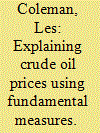

|
|
|
|
|
| Publication |
2012.
|
| Summary/Abstract |
Oil is the world's most important commodity, and improving the understanding of drivers of its price is a longstanding research objective. This article analyses real oil prices during 1984-2007 using a monthly dataset of fundamental and market parameters that cover financial markets, global economic growth, demand and supply of oil, and geopolitical measures. The innovation is to incorporate proxies for speculative and terrorist activity and dummies for major industry events, and quantify price impacts of each. New findings are positive links between oil prices and speculative activity, bond yields, an interaction term incorporating OPEC market share and OECD import dependence, and the number of US troops and frequency of terrorist attacks in the Middle East. Shocks also prove significant with a $6-18 per barrel impact on price for several months.
|
|
|
|
|
|
|
|
|
|
|
|
|
|
|
|
| 14 |
ID:
167227
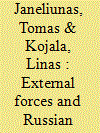

|
|
|
|
|
| Summary/Abstract |
This article analyzes the impact of external factors on Russia’s foreign policy. Specifically, it identifies patterns in Russia’s foreign policy reactions to two kinds of developments: changes in US foreign policy, and fluctuating global oil prices affecting Russia’s economy. Our hypothesis is that US foreign policy, as it is perceived by Putin’s regime, is the key determinant of the Kremlin’s reactions, while the changes in economic trends, affected by oil price, influence the regime’s preference to choose more confrontational or more defensive ways of action. As the analysis shows, different versions of national identity narratives can be constructed within Putin’s regime: it acts as a closed political system that can produce different foreign policy reactions and even ideological narratives without major changes in the governing elite.
|
|
|
|
|
|
|
|
|
|
|
|
|
|
|
|
| 15 |
ID:
103522


|
|
|
| 16 |
ID:
150806
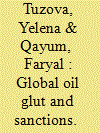

|
|
|
|
|
| Summary/Abstract |
The Russian economy is highly responsive to oil price fluctuations. At the start of 2014, the country was already suffering from the weak economic growth, partly due to the ongoing crisis in Ukraine and Western sanctions. The recent plunge in global oil prices put even further strain on the Russian economy. This paper analyzes the dynamic relationship between oil price shocks, economic sanctions, and leading macroeconomic indicators in Russia. We apply a vector autoregression (VAR) to quantify the effects of oil price shocks as well as western economic sanctions on real GDP, real effective exchange rate, inflation, real fiscal expenditures, real consumption expenditures, and external trade using quarterly data from 1999:1 until 2015:1. Our results show a significant impact of oil prices on the Russian economy. We predict that Russia’s economic outlook is not very optimistic. If sanctions remain until the end of 2017, the quarter-to-quarter real GDP will contract on average by 19 percent over the next two years.
|
|
|
|
|
|
|
|
|
|
|
|
|
|
|
|
| 17 |
ID:
124543
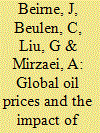

|
|
|
|
|
| Publication |
2013.
|
| Summary/Abstract |
This paper assesses the externality impact of China's excessive growth as a China factor on the world economy via examining the effect of Chinese GDP growth on oil prices as a case for the issue. Our assessment starts, firstly, by estimating a country-level demand model to determine the GDP influences of an individual country on oil demand. Secondly, it estimates the impact of world aggregate demand on oil prices. This two-stage approach enables us to estimate the effect of the GDP growth of an individual nation on oil demand globally and the global price of oil. The estimated demand model is applied to quantify the effect of the Chinese GDP growth on the price of oil through simulations of a range of scenarios for each year over the period 2009 to 2030. We find that China's excessive growth adds a premium to the price of oil which increases over time. The results have policy implications in terms of the sustainability of the Chinese faster growth rate from the perspective of its negative externalities to the world.
|
|
|
|
|
|
|
|
|
|
|
|
|
|
|
|
| 18 |
ID:
115698
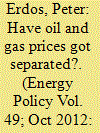

|
|
|
|
|
| Publication |
2012.
|
| Summary/Abstract |
This paper applies vector error correction models that show that oil and natural gas prices decoupled around 2009. Before 2009, US and UK gas prices had a long-term equilibrium with crude prices to which gas prices always reverted after exogenous shocks. Both US and UK gas prices adjusted to the crude oil price individually, and departure from the equilibrium gas price on one continent resulted in a similar departure on the other. After an exogenous shock, the adjustment between US and UK gas prices took approximately 20 weeks on average, and the convergence was mediated mainly by crude oil with a necessary condition that arbitrage across the Atlantic was possible. After 2009, however, the UK gas price has remained integrated with oil price, but the US gas price decoupled from crude oil price and the European gas price, as the Atlantic arbitrage has halted. The oversupply from shale gas production has not been mitigated by North American export, as there has been no liquefying and export capacity.
|
|
|
|
|
|
|
|
|
|
|
|
|
|
|
|
| 19 |
ID:
192050
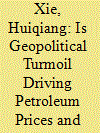

|
|
|
|
|
| Summary/Abstract |
The Iran-Saudi Arabia conflict is an ongoing struggle for influence in the region that has created uncertainty, affected oil prices and regional economics. This paper uses wavelet analysis to examine the frequency and time-varying co-movement and casual nexus between petroleum prices (OP) and financial liquidness (MS) with and without geopolitical risk (GPR). The aim is to test the validity of the monetary equilibrium model from 1988 to 2019. The model is supported by the findings, as both short and medium-term association is found between OP and MS at high frequencies in the presence of GPR. We find a medium-term association between OP and MS in the absence of GPR. The paper’s overall conclusion suggests that GPR affects OP and OP, in turn, impact MS. Diversifying economic activities to minimize oil dependency, which is sensitive to external shocks, is suggested as a mitigation solution.
|
|
|
|
|
|
|
|
|
|
|
|
|
|
|
|
| 20 |
ID:
093504
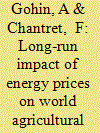

|
|
|
|
|
| Publication |
2010.
|
| Summary/Abstract |
The world prices of some food and energy products have followed similar large swings in recent years. We investigate the long-run relationship between these prices using a world Computable General Equilibrium model with detailed representations of food and energy markets. Particular attention is paid to specifying macro-economic linkages which have often been overlooked in recent analysis and debate. We find that the omission of these macro-economic linkages has a substantial bearing on this relationship. A positive relationship due to the cost push effect has been identified in most analysis, but we find that the introduction of the real income effect may indeed imply a negative relationship between world food and energy prices.
|
|
|
|
|
|
|
|
|
|
|
|
|
|
|
|
|
|
|
|
|